
Faust is the protagonist of a classic German legend based on the historical Johann Georg Faust.
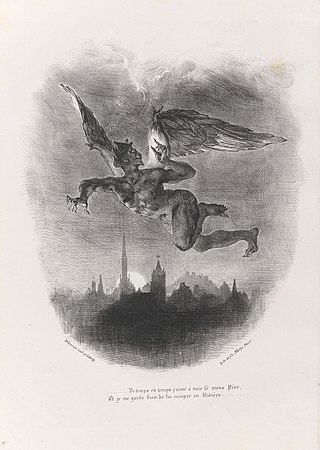
Mephistopheles, also known as Mephisto, is a demon featured in German folklore. He originally appeared in literature as the demon in the Faust legend and has since become a stock character appearing in other works of arts and popular culture.
Mephisto or Mephistopheles is one of the chief demons of German literary tradition.

The Tragical History of the Life and Death of Doctor Faustus, commonly referred to simply as Doctor Faustus, is an Elizabethan tragedy by Christopher Marlowe, based on German stories about the title character Faust. It was probably written in 1592 or 1593, shortly before Marlowe's death. Two different versions of the play were published in the Jacobean era several years later.
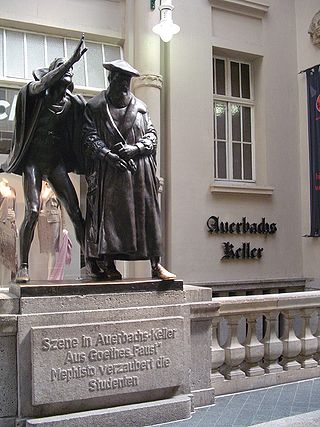
Faust is a tragic play in two parts by Johann Wolfgang von Goethe, usually known in English as Faust, Part One and Faust, Part Two. Nearly all of Part One and the majority of Part Two are written in rhymed verse. Although rarely staged in its entirety, it is the play with the largest audience numbers on German-language stages. Faust is considered by many to be Goethe's magnum opus and the greatest work of German literature.

Mephisto is a fictional character appearing in American comic books published by Marvel Comics. The character first appeared in Silver Surfer #3, and was created by Stan Lee and John Buscema and based on Mephistopheles: a demon character from the Faust legend, who has sometimes been referred to as Mephisto. Introduced as a recurring adversary of the Silver Surfer and Ghost Rider, Mephisto has also endured as one of Spider-Man's most prominent adversaries, being responsible for Norman and Harry Osborn's respective transformations into the Green Goblin and Kindred; and for the superhero's loss of his marriage to Mary Jane Watson, considering their future daughter Spider-Girl his archenemy. Mephisto has often come into conflict with Doctor Strange, Doctor Doom, Scarlet Witch and other heroes of the Marvel Universe, being responsible both for the creation of the Cosmic Ghost Rider and the descents of Phil Coulson and Otto Octavius into villainy.

Faust: The Second Part of the Tragedy is the second part of the tragic play Faust by Johann Wolfgang von Goethe. It was published in 1832, the year of Goethe's death.

The Black Halo is the seventh studio album by American power metal band Kamelot. It was released on March 15, 2005, through Steamhammer Records. It is a concept album inspired by Goethe's Faust. Continuing the story introduced in Epica (2003), it is the second and final record in Kamelot's two-part rock opera about Ariel. Epica tells Part 1 while The Black Halo tells Part 2. Goethe's Faust is also broken into two parts. The Black Halo features guest appearances by Simone Simons (Epica), Shagrath, Jens Johansson (Stratovarius), and several others. The album was released on vinyl in the spring of 2009, along with Ghost Opera (2007).
The Devil, appears frequently as a character in literature and various other media. In Abrahamic religions, the figure of the Devil, Satan personifies evil.
Faust is the protagonist of a German tale who makes a pact with the Devil. The character is based on a real person, Johann Georg Faust. The tale is the basis of many works.
Faust has inspired artistic and cultural works for over four centuries. The following lists cover various media to include items of historic interest, enduring works of high art, and recent representations in popular culture. The entries represent works that a reader has a reasonable chance of encountering rather than a complete catalog.
Faust is a manga by Osamu Tezuka that was published in tankōbon form in 1950.
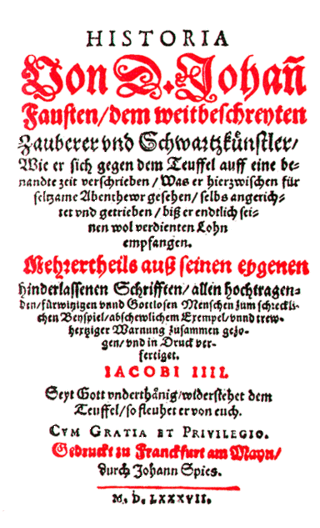
Johann Spies was a German printer who published an anonymous book of tales about a legendary Doctor Faust who made a pact with the Devil. The story became the basis for several notable literary works, including Marlowe's Tragedy of Doctor Faustus and Goethe's Faust.
The Goetic demon Astaroth, whose name is derived from Ashtoreth, the biblical spelling of the name of the Phoenician goddess Astarte, has appeared many times in modern popular culture.
The demon Belial, or characters named for him, have appeared in many examples of modern culture. This is distinct from medieval culture and Milton where Belial was related to the character in Jewish sources.
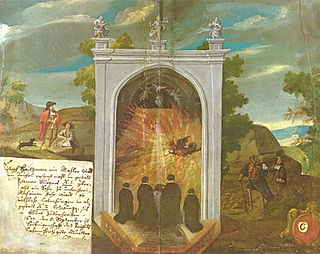
The idea of making a deal with the devil has appeared many times in works of popular culture. These pacts with the Devil can be found in many genres, including: books, music, comics, theater, movies, TV shows and games. When it comes to making a contract with the Devil, they all share the same prevailing desire, a mortal wants some worldly good for their own selfish gain, but in exchange, they must give up their soul for eternity.

Soul Cartel is a South Korean manhwa series written by Kim Eun-hyo and illustrated by Kim Yeong-ji. Started on 2012, this webtoon manhwa was released on Naver WEBTOON and its final raw chapter was published on April 6, 2016.

Faust, known as Seven Games of the Soul in North America, is 1999 graphic adventure game created by Arxel Tribe, Anne Carrière Multimedia and Cryo Interactive. Loosely inspired by Goethe's Faust, it tells the story of Marcellus Faust and his battle of wills with the demon Mephistopheles.

Faustus, the Last Night is an opera in English by French composer Pascal Dusapin, inspired by Doctor Faustus by Christopher Marlowe. The work was premiered on 21 January 2006 by the Berlin State Opera, a coproduction with the Opéra de Lyon. It was first staged in the United States at the Spoleto Festival USA 2007.
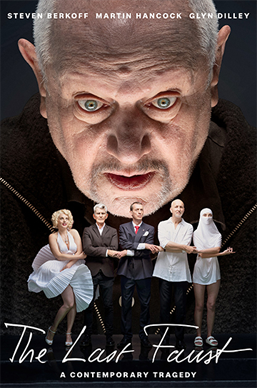
The Last Faust is a 2019 feature art film written and directed by the German artist Philipp Humm. Set in 2059, it is a contemporary interpretation of Johann Wolfgang von Goethe's 1808 Faust and the first film directly based on both parts of the tragedy. It stars English actors Steven Berkoff and, Martin Hancock (Faust). Its music is based on Richard Wagner with tracks from Swiss electronic music duo Yello.












